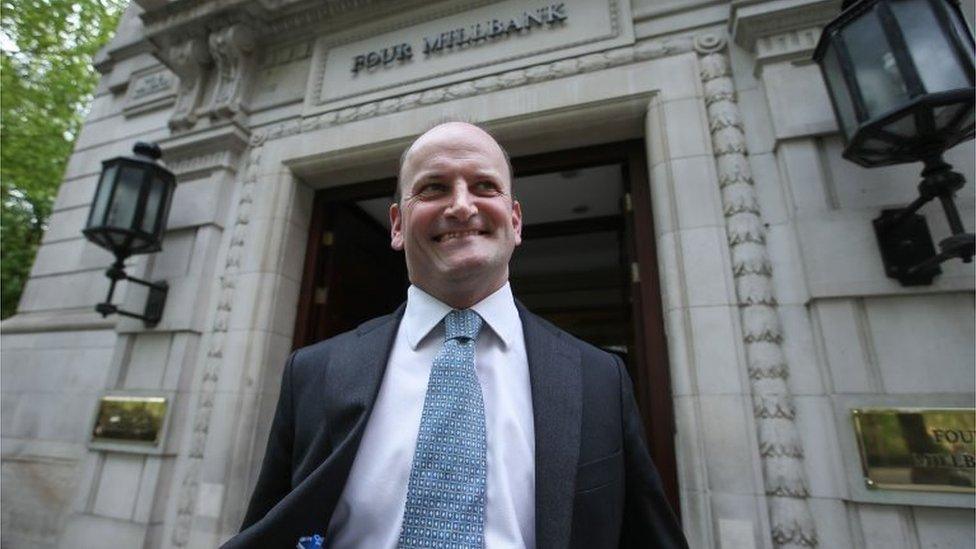Farewell to an independent-minded MP
- Published
- comments

So. Farewell. Then. Douglas Carswell.
The independent MP for Clacton will not be contesting the seat he won in the Conservative interest in 2005, then held in a by-election, and General Election on behalf of UKIP. And so ends one of the more remarkable - and effective - parliamentary careers of the 21st Century.
I've just been interviewing him for BBC Radio 4's Today in Parliament (you can hear the result on Friday night at 11.30pm) and he does a happy riff on Enoch Powell's oft-quoted remark that all political careers end in failure.
Despite his odyssey across the political landscape, he does not believe that can be said of him; his great goal was Brexit, and Britain has now voted Leave. "Job done," he says.
But that is not his only footprint in the Westminster sand. As a newly-minted, and until then, barely visible backbencher, he led the Commons uprising that toppled Speaker Michael Martin, over his handling of the expenses scandal.
And it is hard to understate how much sheer bottle was required to do that. That is the point about Carswell - he has the rare combination of strong views and the courage to express them and the tactical streetsmarts to make them happen.
It may not make him many friends, but - like or loath his aims - it makes things happen.
More than a eurosceptic
He was never a mere eurosceptic, having entered Parliament committed to getting Britain out of the EU - he once remarked that the only job he wanted in government was to be the last-ever minister for Europe.
And he was soon one of the key figures in the band of backbench rebels who harried David Cameron and the Coalition with a series of Commons manoeuvres designed to pressure his leadership into a referendum commitment.
He also became one of its most articulate public voices - not least because he was capable of making the case in accessible language which often seemed beyond many of the old guard Maastricht rebels.
He also says he is not really a Tory - challenging establishments, he says, is so central to his politics that he could not sit comfortably on the Conservative backbenches, were he invited to return the the fold.
He was part of an awkward-squad political cell with people like his close ally Mark Reckless and two major Vote Leave figures, Matthew Elliott and Dominic Cummings, which pushed for radical policies (check out Cummings' record as special advisor to Michael Gove as education secretary) and had been plotting strategy to get Britain out.
Carswell's 2014 defection to UKIP turns out to have been more strategic than people realised at the time. He was not merely a disaffected politician seeking a new home, he was out to shape what he (rightly) believed was an inevitable referendum on Britain's EU membership - and his key aim was to be sure that his new party did not dominate the Leave campaign.
He points out that in his speech announcing his switch, he talked about the need for a liberal radical narrative to promote Brexit, and warned that Leave could not win if it campaigned with a "nativist" face.
In effect, he joined a party to sideline its leader from a national campaign. And he succeeded. But in the process relations with UKIP colleagues became toxic, and eventually, he walked.
Never a natural team-player, his new book, Rebel: How to Overthrow the Emerging Oligarchy attacks the clubbable Tea-Room chumocracy of the House of Commons. He probably won't miss it, and it probably won't miss him….
His parting shot is a ringing endorsement of Theresa May as a prime minister converted to his vision of Brexit, and capable of delivering it.
He says he did not want to continue in Parliament, never sought the Conservative nomination for his seat, and even contemplated announcing that he would stand down the day after the EU referendum.
The snap election triggered this week simply brought forward a two-year exit strategy, which would have unfolded in 2019, if the current Parliament had been allowed its full five-year lifespan.
Whatever view is taken of Carswell's policies, his parliamentary career deserves some study - not least because it shows how an effective political campaigner can use Parliament and the new campaigning possibilities afforded by social media, to bring real change.
I will be talking to Douglas Carswell about his new book on BBC Parliament's BOOKtalk at 8.45pm on Saturday, and the program will be repeated on Sunday evening.